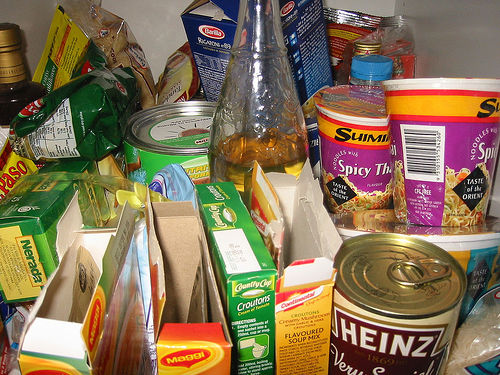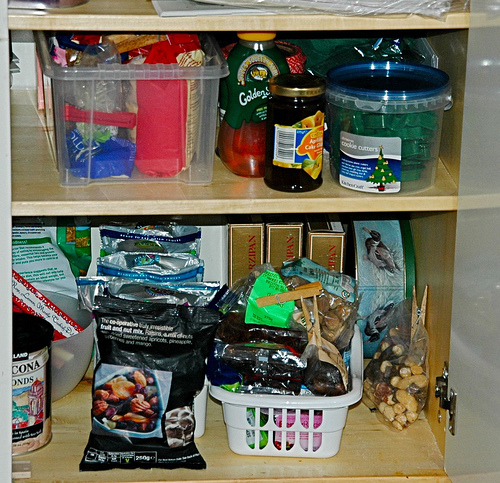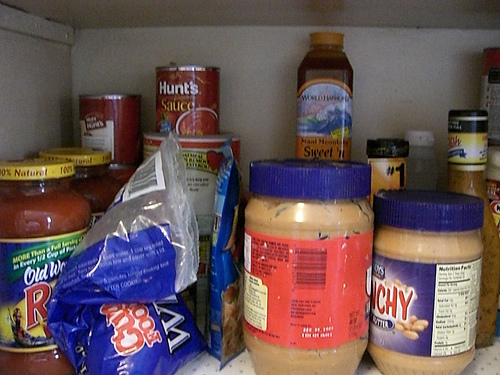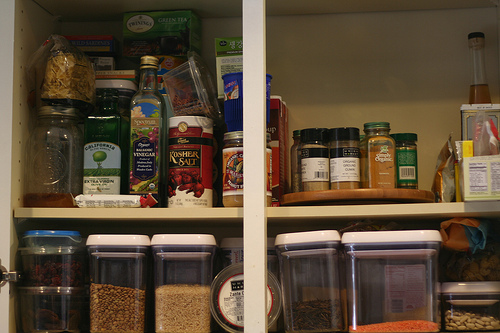Four things to do with unwanted pantry goods

I spent a big chunk of last weekend doing a big spring cleaning/decluttering thing. I ended up taking three giant black garbage bags of stuff to the thrift store to donate, and cleaned out my pantry besides.
I was surprised at all the food I found lurking in the back of my cupboards. Things that I will either never eat, or that I don't eat on my current diet. But what to do with all those unwanted pantry goods?
When cleaning out your pantry, start with a basic stort. You can safely assume that anything you haven't touched in a year is on "The List." Pile all of these foods together in one spot, whether it's on the counter, on a table, or in a big cardboard box.

Image courtesy Flickr/ramtops
1. Trash/compost it
Some things should not be eaten by anyone. Packages that have been open for more than six months are probably stale, and may harbor pantry moths or flour beetles. Canned goods that are several years past their expiration date may be safe to eat, but they will not be tasty at all. Cans that show a lot of rust along the seams should be thrown away, because they may have been contaminated. Don't mess around with botulism!
Set aside your guilt, and don't get caught up in the sunk cost fallacy. If you bought an entire bottle of fish sauce and only used it once several years ago, don't let it continue to weigh you down and take up space. Get rid of it! Don't resolve to use it more in the future and keep it, because despite your best intentions, you won't. (And if you do really need fish sauce, allow yourself to splurge on the $4 it costs to buy a new bottle.)

Image courtesy Flickr/ramtops
2. Donate it to a food bank
There will be a lot of things that you already know you'd rather be rid of. Doesn't every house come with a can of creamed corn that no one will ever eat?
Unopened packages of dry goods like pasta and canned goods that have not expired can be donated to your nearest food bank. This is not necessarily the best use of financial resources. The food bank would much rather have your dollar than the can of beans that cost you a dollar. (Canned food drives typically do more harm than good to the charities they support.) But it's better than throwing it away, and no food bank will ever turn away food donations that follow their safety guidelines.
If you have unopened cans of cat or dog food (perhaps because your pet passed away, or just decided they didn't like that particular brand or flavor) these can be donated either to a people food bank or to a local animal shelter.

Image courtesy Flickr/thehoneybunny
3. Eat it!
You will find a lot of things on "The List" that you can't quite bear to part with. That's okay, but put a limit on it. Say a week. Eat as much of those things as you can in a week, and everything you don't get around to eating gets kicked to the curb. Be firm with yourself, and stick to your deadline!
I have had a lot of success Googling the phrase "Other uses for _________". Other uses for refried beans, other uses for canned corn, other uses for canned tuna, other uses for dry pasta. You get the idea. There are a hundred other ways you can use something, and clever internet people have thought of them all.

Image courtesy Flickr/clarestoker
4. Swap it
Partner up with a friend and swap unwanted pantry goods that are nice or fancy in some way. You may be reluctant to donate a $15 tube of marzipan paste to a food bank, but I bet you know someone in your social circle who would be delighted to get free marzipan. This is also a great way to get rid of weird things like capers or bottles of wine, things that a food bank may not want to accept.
You could hold a swap meet dinner party, exchange things casually with your acquaintances, or hold a bag swap where everyone brings a bag of food and you swap the whole thing at once. There's just one rule with an event like this: No takebacks!
Main image courtesy Flickr/mike lowe

2 comments